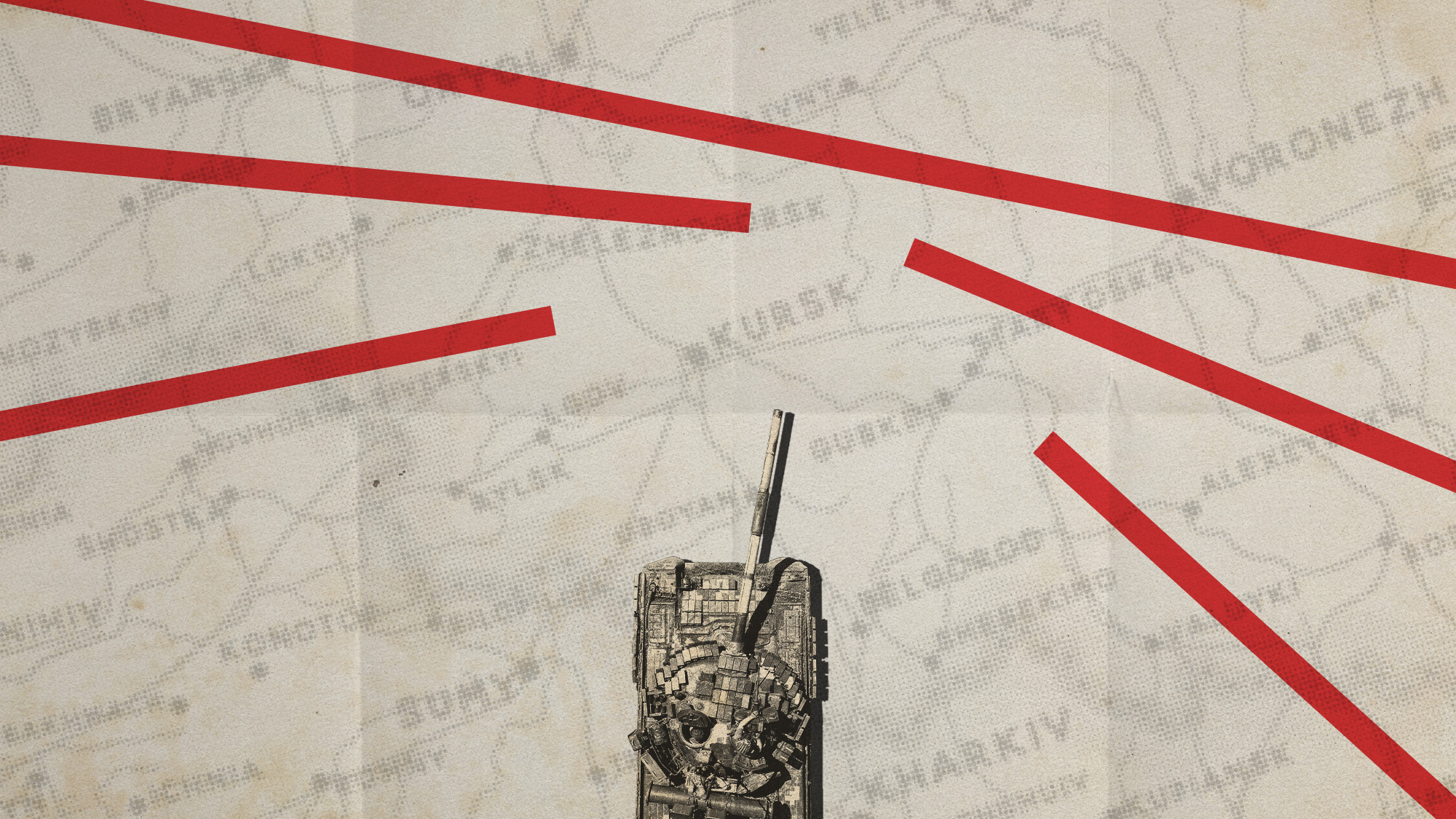What are the lessons from Ukraine's Russia incursion?
And what do they mean for Putin's red lines?


The best defense is a good offense. At least, that's what Ukrainian President Volodymyr Zelenskyy seems to think. His country's shocking incursion into the Kursk region of Russia is part of a "victory plan" designed to force Vladimir Putin to the negotiating table after two years of war, said the BBC. "It may sound too ambitious for some," Zelenskyy told a news conference this week, "but it is an important plan for us."
"Ukraine has scrambled assumptions with its push into Kursk," Max Boot said at The Washington Post. Putin had long vowed that any threat to Russia's territorial integrity would be crossing a "red line" that could end with the use of nuclear weapons — and possibly the outbreak of World War III. That, in turn, prompted U.S. President Joe Biden to put limits on U.S. aid to Ukraine. Now? Putin is acting as though it's "it's business as usual for the Kremlin" even though Ukraine has captured 500 square miles of Russian land. Maybe those red lines are "not as menacing as President Joe Biden seems to imagine."
'Far short of nuclear escalation'
"Did Ukraine just call Putin's nuclear bluff?" Joshua Keating said at Vox. Kyiv's leaders "likely hoped to send a message" that American and European allies have been "overly cautious" about crossing Putin's red lines. Moscow has launched missile and drone barrages at Ukraine in response. That's "far short of the nuclear escalation" that Putin had threatened. Zelenskyy's argument now is that Western leaders can become "much more aggressive" in helping Ukraine win the war.
The Week
Escape your echo chamber. Get the facts behind the news, plus analysis from multiple perspectives.

Sign up for The Week's Free Newsletters
From our morning news briefing to a weekly Good News Newsletter, get the best of The Week delivered directly to your inbox.
From our morning news briefing to a weekly Good News Newsletter, get the best of The Week delivered directly to your inbox.
But there may be a reason Russia hasn't responded more aggressively. "Its own invaders are busy," said The New York Times. Putin's failure to repel the incursion isn't just a "matter of personnel and lack of battlefield intelligence" — it's also about priorities. And for Russia, that priority is capturing the city of Pokrovsk in Ukraine's Donbas region. Since Ukraine's incursion earlier this month, Russia's "steady gains near Pokrovsk have, if anything, picked up." The incursion is important to Russia's leaders, but it is also seen as a diversion from the real battle. "If you throw everything you've got to Kursk," said a former Russian diplomat, "then you are playing the Ukrainian game."
'Symbolic and psychological significance'
Ukraine going on offense has done "little to alter the fundamental dynamics of the conflict," Macalester College's Andrew Latham said at The Hill. Russia simply has more troops and armaments. That means "every soldier, tank and piece of artillery" Ukraine uses in Russia is a "loss" to efforts to free its own captured territories. And Putin could still choose the path of escalation if the incursion is prolonged. "It is a dangerous game of chicken."
The incursion has "symbolic and psychological significance" that Ukraine can use to defeat Russia, Adam Borowski said at The Kyiv Post. It's more than land and strategic positioning that's at stake: There's also "Russian imperial pride." And when the "daunting task" of negotiating an end to the war arrives, Ukraine will be able to do so from a "position of strength." That makes the operation a "symbol on which to build Ukraine's future."
A free daily email with the biggest news stories of the day – and the best features from TheWeek.com
Joel Mathis is a writer with 30 years of newspaper and online journalism experience. His work also regularly appears in National Geographic and The Kansas City Star. His awards include best online commentary at the Online News Association and (twice) at the City and Regional Magazine Association.
-
 Metal-based compounds may be the future of antibiotics
Metal-based compounds may be the future of antibioticsUnder the radar Robots can help develop them
-
 Europe’s apples are peppered with toxic pesticides
Europe’s apples are peppered with toxic pesticidesUnder the Radar Campaign groups say existing EU regulations don’t account for risk of ‘cocktail effect’
-
 Political cartoons for February 1
Political cartoons for February 1Cartoons Sunday's political cartoons include Tom Homan's offer, the Fox News filter, and more
-
 Did Alex Pretti’s killing open a GOP rift on guns?
Did Alex Pretti’s killing open a GOP rift on guns?Talking Points Second Amendment groups push back on the White House narrative
-
 Washington grapples with ICE’s growing footprint — and future
Washington grapples with ICE’s growing footprint — and futureTALKING POINTS The deadly provocations of federal officers in Minnesota have put ICE back in the national spotlight
-
 Trump’s Greenland ambitions push NATO to the edge
Trump’s Greenland ambitions push NATO to the edgeTalking Points The military alliance is facing its worst-ever crisis
-
 Why is Trump threatening defense firms?
Why is Trump threatening defense firms?Talking Points CEO pay and stock buybacks will be restricted
-
 Trump considers giving Ukraine a security guarantee
Trump considers giving Ukraine a security guaranteeTalking Points Zelenskyy says it is a requirement for peace. Will Putin go along?
-
 Vance’s ‘next move will reveal whether the conservative movement can move past Trump’
Vance’s ‘next move will reveal whether the conservative movement can move past Trump’Instant Opinion Opinion, comment and editorials of the day
-
 What have Trump’s Mar-a-Lago summits achieved?
What have Trump’s Mar-a-Lago summits achieved?Today’s big question Zelenskyy and Netanyahu meet the president in his Palm Beach ‘Winter White House’
-
 Who is paying for Europe’s €90bn Ukraine loan?
Who is paying for Europe’s €90bn Ukraine loan?Today’s Big Question Kyiv secures crucial funding but the EU ‘blinked’ at the chance to strike a bold blow against Russia
